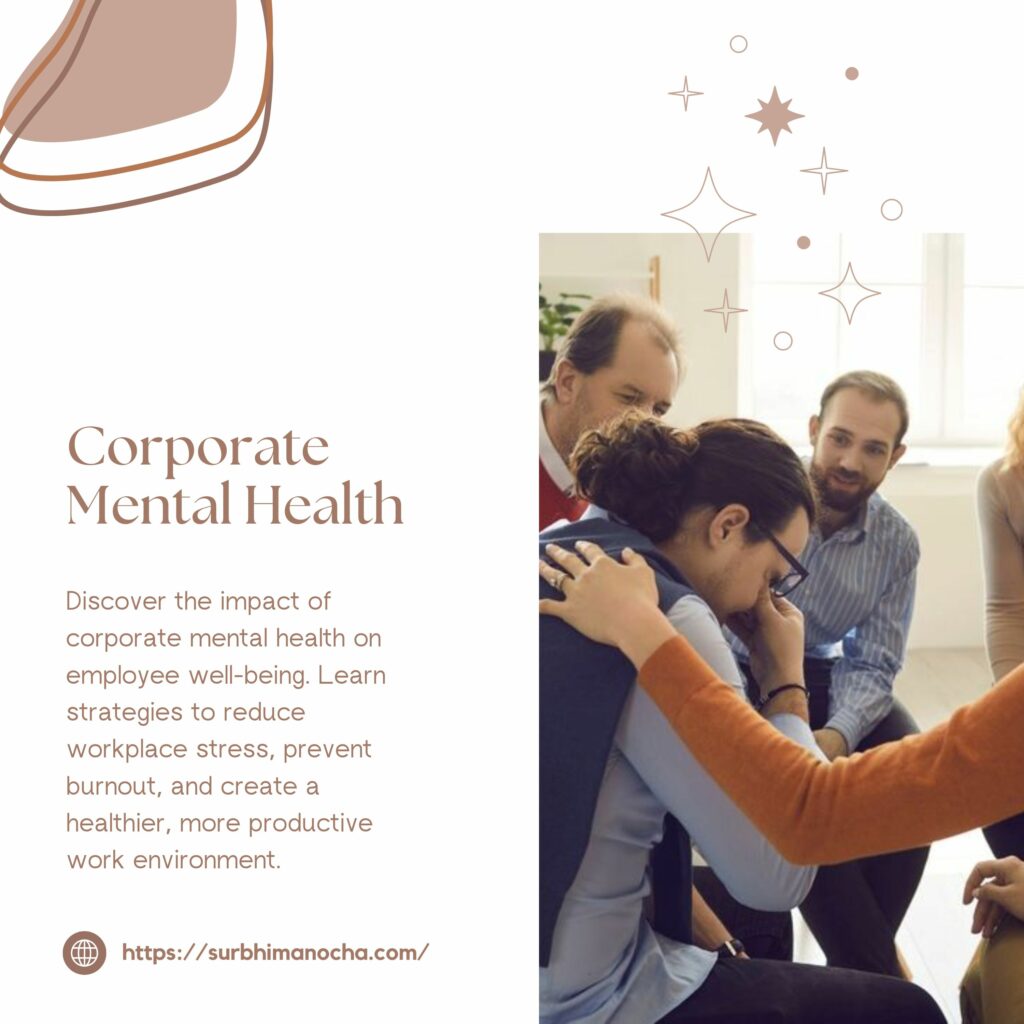In today’s fast-paced corporate world, workplace stress has become an inevitable part of many employees’ lives. With long hours, constant deadlines, and pressure to perform, the mental health of professionals is at risk, particularly in a country like India, where work culture often places high demands on individuals.
While stress itself is not inherently bad, chronic stress can have severe consequences on mental and physical health. In this blog, we will explore the impact of workplace stress on mental health and provide practical strategies to help cope and thrive in high-pressure corporate environments.

The Growing Concern of Workplace Stress in India
India’s corporate world is booming, with industries expanding rapidly and employment opportunities on the rise. However, this has come with a cost. According to a report by the Indian Psychiatry Society, nearly 43% of Indians suffer from some form of mental illness, and workplace stress is a major contributing factor.
In 2020, a survey by Assocham revealed that 42.5% of employees in the Indian private sector suffer from depression or anxiety. Long working hours, unrealistic performance expectations, job insecurity, and poor work-life balance are some of the primary drivers of workplace stress. The COVID-19 pandemic has only exacerbated these issues, with many employees experiencing burnout from remote work, isolation, and the blurring of boundaries between personal and professional lives.
The Mental Health Impacts of Workplace Stress
- Anxiety and Depression Prolonged workplace stress can lead to anxiety and depression. Employees may experience constant worry, irritability, or feelings of hopelessness due to the overwhelming demands placed on them. Over time, this can impact their productivity, creativity, and overall job satisfaction.
- Burnout Burnout is a state of physical, emotional, and mental exhaustion caused by excessive work-related stress. A survey conducted by LinkedIn in 2021 revealed that more than 50% of Indian professionals felt burnt out due to work. Burnout can lead to decreased motivation, fatigue, and a lack of enthusiasm for daily tasks, making it difficult for employees to maintain a healthy work-life balance.
- Physical Health Decline Chronic stress doesn’t just affect mental well-being but also takes a toll on physical health. Many Indian professionals report symptoms like headaches, sleep disturbances, digestive issues, and weakened immune systems due to workplace stress. Long-term, unchecked stress can even lead to more serious conditions like heart disease and hypertension.
- Reduced Productivity High levels of stress can impair cognitive function and lead to poor decision-making, reduced focus, and mistakes at work. This can create a vicious cycle, where decreased productivity leads to even more stress as deadlines loom and expectations increase.
- Increased Risk of Substance Abuse In India, stress and mental health issues at work are also closely linked with substance abuse. To cope with the pressures of their corporate roles, some employees may turn to alcohol or drugs as a temporary escape, further deteriorating their mental and physical health.
Strategies to Cope with Workplace Stress and Thrive
1. Set Boundaries
One of the most effective ways to manage stress is by setting clear boundaries between work and personal life. Communicate with your employer about your work hours and stick to them. This helps prevent burnout and allows for adequate rest and recovery after a long day.
2. Prioritize Self-Care
Regular exercise, a healthy diet, and quality sleep are crucial for maintaining mental and physical well-being. Engaging in activities like yoga, meditation, or hobbies outside of work can help relieve stress and improve overall mood.
3. Develop Time Management Skills
Effective time management can prevent feelings of overwhelm. Break down large projects into manageable tasks, use tools to track deadlines, and avoid multitasking to ensure you stay on top of your workload without unnecessary stress.
4. Seek Social Support
Building strong relationships with coworkers and having open communication with supervisors can help alleviate workplace stress. Talking about your challenges with trusted colleagues or friends can offer emotional relief and provide helpful advice for managing tough situations.
5. Recognize the Signs of Burnout
Awareness is key. If you’re feeling unusually tired, disengaged, or emotionally drained from your work, take these signs seriously. It may be time to re-evaluate your workload, seek professional help, or consider switching to a role that aligns better with your mental well-being.
6. Consider Professional Counseling
If workplace stress is significantly affecting your mental health, seeking the help of a mental health professional can be life-changing. Counseling can provide a safe space to discuss your challenges, develop coping strategies, and regain control over your life.
Conclusion
Workplace stress is a significant contributor to mental health issues in India, but it doesn’t have to take over your life. By setting boundaries, practicing self-care, and seeking support when needed, you can manage stress and maintain a healthy work-life balance. Taking proactive steps to prioritize mental well-being is essential not just for professional success but also for personal happiness and long-term health.
If you are struggling with mental health challenges and feel overwhelmed by workplace stress, it’s important to seek professional support. Surbhi Manocha, an experienced counseling psychologist, offers compassionate guidance to help you navigate stress, anxiety, and burnout. Visit her website today and take the first step toward improving your mental health and thriving both in your career and personal life.
